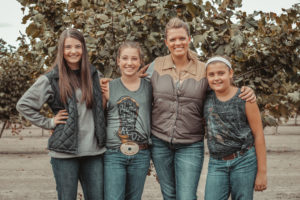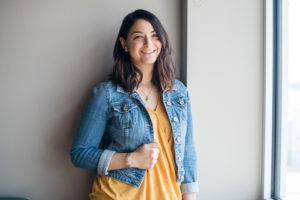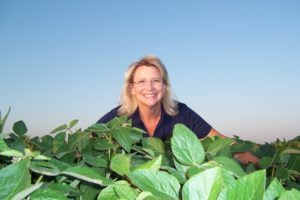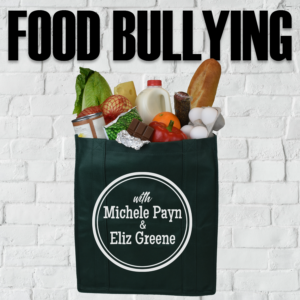Michele Payn's Blog, page 9
January 21, 2020
How to overcome food anxiety & B.S. health claims
The “health industry” is a business of money, contends Bill Sukala, a Registered Dietitian Nutrition and Clinical Exercise Physiologist in Australia. He has three decades of experience as a consumer health advocate in standing against the latest trends in health and food. Listen in to this episode to help yourself not be swayed by the tide of public opinion and the latest health claim.
Advertising confuses people and creates anxieties around food and health. Bill brings a voice of reason and is concerned that the “gatekeeper of information has been chloroformed.” His B.S. detector raises red flags about bad information, misinformation and quackery in food and health claims.
Key points
Using “why?” as a fear filter in food and nutrition claims.
Looking at health and food marketing claims through the lens of science; there’s a lot of misinformation out there.
Remember we can’t live on one single food alone; messages about how a kind of food is “good” or “bad” is confusing. People are getting too focused on one viewpoint and it’s creating factions.
Quality of information and the way it is presented is creating food anxiety. Food and exercise shouldn’t be good or bad, but dividing people builds tribes and eliminates middle ground
Evaluating health claims and where those claims are coming from; advertising manipulates your emotions and therefore, bullies you. People aren’t aware of how much food advertising confuses them and creates food anxieties.
The business is making money and health is the storefront to draw people in. The diet world has so many factions. Nutrition has become a religion where people don’t care about your facts or evidence.
The B.S. detector is meant to give people more of a critical eye to protect themselves. It captures a lot of red flags of bad information, misinformation, or quackery and helps people not be so trusting of health marketing claims.
The difference between science, statistical significance, and clinical significance. Marketing claims are often lifted out of context.
Tips to overcome food bullying: 1) Ignore the trolls, don’t be swayed by the tide of public opinion 2) Protect yourself from misinformation on social media, evaluate claims critically 3) Don’t get sucked into the cult-ism of nutrition.
 Fabulous quotes
Fabulous quotes
“The food and health marketing industry is out-of-control.”
“Superfood is not a real thing – it’s a marketing term.”
“You can have red meat, even if you’re a cardiac patient.”
“Polarization is central to making sales and building followers.”
“The business is money. The storefront is health.”
“Nutrition is becoming a religion.”
“Scientific illiteracy is a massive problem. People can be hoodwinked easily by health claims.”
“Nutrition is a science, but is not all that sexy.”
“If I could give every person just the right of nourishment and exercise, not too little and not too much, we would have found the safest way to health” – Hippocrates
Links
@Bill Sukala
drbillsukala.com
The B.S. Detector
Food Bullying: How to Avoid Buying BS by Michele Payn
Embrace your Heart with Eliz Greene
January 10, 2020
Does your voice matter in the politics of food & agriculture? Episode 21
Explaining “This is what we do and how we do it” helps a legislator understand agriculture and natural resources, and is easier than swaying public perception. Shelly Boshart Davis knows firsthand, as she’s gone from the farm to the capitol. She wears a variety of titles: State Representative, wife, farmer, mom, and business owner. Shelly runs a trucking company, is active on their farm with her husband and three daughters.
“Misrepresentation that affects farm families through agricultural policy” is what food bullying looks like to Shelly. She shares her experiences as an elected official, building consensus, and what she saw with the #TimberUnity movement in Oregon. “Your voice matters” – especially when combined with others.
Key points
State and national legislation increases food costs
Oregon port crisis drove Shelly’s legislative advocacy
Farming is very diverse in Oregon: over 200 crops grown in the state and 39% of decision makers on farms in Oregon are female
State vs. national legislation: differences and unintended consequences
Public perception and constituent involvement
The value of tours to farms and small businesses
Reaching across the aisle to build consensus: go where can you mutually agree on an issue.
#TimberUnity: boots on the ground, firsthand knowledge of natural resources
The power of people’s voices. What is your united cause?
Unbalanced power leads to bullying
Look beyond the messaging, marketing, and label on food
Tips to overcome food bullying
Fabulous quotes
“There aren’t enough people in legislature with real-life working experience.”
“With ag policy, there are unintentional consequences.”
“Public perception is scary how quickly it can change and be tough to combat.”
“Relationship is key. Prove that you’re trustworthy.”
“Build consensus so that when you talk, so someone wants to listen to you.”
“#TimberUnity was so inspiring when thousands of people came to the capitol saying ‘Please listen to us.’”
“The power of people’s voices matter.”
“Be trustworthy, a go-to person, and willing to put yourself out there.”
“It’s our job as parents to pass on good information to children.”
Links
Twitter & Instagram: @boshartdavisag
Facebook: Shelly Boshart Davis
Website: www.shellyboshartdavis.com
Food Bullying with Michele Payn
Embrace Your Heart with Eliz Greene
January 7, 2020
How to have a meaningful conversation about food: Episode 20
How do you have a meaningful conversation with others in today’s overly emotional food arena? In this podcast episode, dietitian Leia Flure explains the steps to maintaining respectful discussion and making personal choices about what you eat. She suggests more critical thinking is needed in food-based decisions by being analytical about your choices and verifying information.
“What is the motivation behind what I am sharing and what information I am opening myself up to?” A mom to young children and a millennial, Leia shares her personal experiences with other people as she conveys the message to stay open-minded with what you are believing. She suggests you step outside your comfort zone, listen to the other side, know your own standards, and enjoy food!
 Key Points
Key Points
What do you do when people disagree with you?
Providing unbiased information and having difficult conversations
Respectfully countering inaccurate information
What are we supposed to believe when it comes to food safety; how do we perceive information from a variety of sources?
Self-preservation and the difficulty of admitting when you are wrong.
The hypocrisy when it comes to taking risks with food
How to overcome bias and admit you are wrong
Stepping outside of your comfort zone
Risk bias and how the dirty dozen list drives people to avoid produce.
Fabulous Quotes
“It’s just so difficult to have a productive conversation when both sides are not willing to see the other person’s point of view.”
“Sometimes it’s worth staying in the conversation and finding a way to have that conversation that is not questioning a person’s integrity because something different than what you believe, but also knowing when it is okay to just step away.”
“It’s okay to have questions. I think the issue is really seeking out information from reliable sources and not necessarily relying on Dr. Google.”
“The way that we evaluate risk is kind of skewed, and flawed.”
“Do you think our psychology around food is skewed not just because sometimes we can be hypocritical in our choices but because what we want to believe isn’t always true?”
“What is the motivation behind even what I am sharing and what information I’m opening myself up to?”
“We like things that are easy.”
“We just don’t like to think about risk and we want to believe that we infallible, but truly we take risks every single by just going outside, and it is very uncomfortable to think about.”
“If I can do this one little thing, I can buy the organic strawberries instead of the regular ones in the grocery store, then I feel better about my choices, but it doesn’t mean that is actually doing anything for me.”
“Of course, as a dietitian, I’d rather people eat more fruits and vegetables instead of be afraid of them and decrease their intake.”
Links
Leia’s blog: moderationmaven.com
Embrace Your Heart with Eliz Greene
Food Bullying with Michele Payn
January 3, 2020
Why do bullies call farmers animal abusers? Episode 19
Why is it so easy to call farmers names despite the great efforts they put in place to ensure we have food? “It hurts so much when someone says that I am an animal abuser because sometimes I work day and night take care of my animals.” German dairy farmer Agnes Greggersen, from the northern part of Germany is the latest guest on the Food Bullying podcast. Unfortunately, Agnes was cyber bullied by animal rights activists for posting a video of a child drinking a glass of milk. Her experience was horrible, but she chose not to give up on being an agriculture advocate and turned the experience into a lesson, now helping other farmers understand why they need to engage in social media.
Key Points:
Cyber bullying’s impact on farmers
Large scale food bullying
How to rise above cyber bullying
Tips on how to overcome food bullying
The Conversation:
(00:38): Agriculture advocacy
(03:18): How Agnes got cyber bullied
(09:34): How farmers can deal with cyber attacks
(13:52): Rising above cyber bullying
(19:20): Tips on how to overcome food bullying
Fabulous Quotes:
“Consumers shouldn’t be afraid to ask the farmer questions.”
“Inform yourself when you hear stories of food bullying, then maybe look for a way of getting information maybe directly from a farmer.”
“In order to care for animals as a farmer, it has to be a passion.”
“It hurts so much when someone says that I am an animal abuser because sometimes I work day and night take care of my animals.”
“I do my very best to take care of the animals not because it is a job, but it is a passion for me.”
“At the end of the day, we are responsible for telling our story and to every person out there who’s tired of having the wrong story told about how food is grown.”
“I always encourage people to know what their purpose is and social media.”
“If you’re not telling your story, somebody else will.”
Links to Checkout:
Agnes on Facebook
Ferienhof Greggersen
Food Bullying: How to Avoid Buying B.S. by Michele Payn
Embrace your Heart with Eliz Greene
December 23, 2019
Are you feeding your brain trash? Episode 18
“Food is such an integral part of our social fabric. It becomes a part of the storytelling process,” but our farming memory is being lost across generations, says Dr. Cami Ryan, a Canadian social scientist on the latest Food Bullying podcast. This loss of farming memory has created gaps and barriers between rural and urban. Opportunists fill in the gaps with new information, which isn’t always accurate.
Cami explains how food can be taken on as identity, leaving a person susceptible to bullying. She offers insight on information literacy as a way to keep the trash out your brain and social feeds. “Be careful what you feed your brain and share with other people.” She cautions against littering Facebook or Twitter with bad information.
Key Points
What is a social scientist?
How do people see food production and where do all the players connect together?
How do farmers interact with non-farmers and deal with social constructs?
The importance of translating the science of agriculture
Cognitive responses to fear and disgust and what it means to food
Understanding how food can be taken on as identity and leave you susceptible to bullying
Do people trust science today?
Focus on information literacy to keep trash out of your brain
How to read vet new studies and read information
Call people out who litter on Facebook, the same as you would if they put trash on the road
Identifying good and bad information; avoid Twitter litter and Facebook trash
Biases and how we all have them
Quick tips to overcome food bullying: don’t take it personally, leverage your network to ask for help, give yourself permission to walk away from a non-productive conversation.
Fabulous Quotes 
“The onus is on farmers and scientists to engage and provide accurate information”
“Disgust is really interesting. Humans respond viscerally.”
“The more you are exposed to something, the less you fear it.”
“Food is such an integral part of our social fabric. It becomes a part of the storytelling process.”
“When you take something on as your identity, such as food or social media, it becomes very personal.”
“We, as individuals, have to take responsibility for our brains.”
“Be careful what you feed your brain and share with other people.”
“We have a responsibility to clean up our Facebook feeds and Twitter litter.”
It’s not about whether we have biases or not, it’s our willingness to push back against our biases.”
Links
@CamiDRyan on Twitter
www.camiryan.com
Cami Ryan, PhD FB page
Food Bullying: How to Avoid Buying BS by Michele Payn
Embrace your Heart with Eliz Greene
December 17, 2019
A father & farmer on food bullying & fruitcakes: Episode 17
Are you a cherry lover? This is an episode that you cannot afford to miss. Our guest today is a cherry farmer in Leelanau County, Michigan. His family also owns and operates Leelanau Fruit Company, a small cherry processor specializing in Maraschino cherries, ice cream, cherries, and glossy fruit mixes used in holiday fruitcakes.
In today’s episode, Ben LaCross takes us through the process of growing, harvesting, and processing cherries. He tells us about the challenges cherry farmers face in their product. Ben also shares how his daughter was food bullied by a teacher in school.
 Key Points:
Key Points:
How are farmers bullied?
Food bullying that Ben has seen as a dad
How to know which cherries are produced in the U.S.
Why are cherries not grown organically in Michigan?
The Conversation:
(02:39): Ben’s introduction
(04:40): Cherries’ 101 lesson
(10:01): Food bullying that Ben has seen with his children
(19:38): Food bullying from the producer’s side of view
(23:41): How can you identify what cherries are produced in the US?
(26:04): Find out why cherries are not organically grown in Michigan
(30:33): Tips to overcoming food bullying
Fabulous Quotes:
“Be confident in what you buy, and don’t let other people’s opinions about your food affect how you think about your food.”
“Try to buy U.S. products as much as you can.”
“Food isn’t a status symbol.”
“There’s room for a lot of different products in our in our diets.”
“When we create anxiety around food because of different arbitrary rules that are put in place by people, especially with younger kids, it makes kids scared about what they eat.”
“I do want to raise consumers who trust the food system.”
“We don’t want our kids to be raised with anxiety about food.”
Links:
Ben’s Twitter
Ben’s website
Ben’s Facebook
Food Bullying: How to Avoid Buying BS by Michele Payn
Embrace your Heart with Eliz Greene
December 10, 2019
Is your emotional brain being tricked by food marketers? Episode 16
Our brain has a lot of processes that help us to make decisions and evaluate pieces of evidence for those decisions. Part of our brain is very attuned to just accumulating evidence for the value of something. It integrates all of the different pieces of evidence that we might experience about a particular choice and put it together in terms of terms of overall value, how much we might like it, or want to approach that thing.
“Food marketers are well aware of the kind of differences amongst these technologies in terms of which ones we like and which ones we don’t like.” Dr. Tyler Davis, a neuroscience researcher at Texas Tech, helps us understand of the high-risk food technologies that he has researched and shares tips on how we can overcome food bullying by understanding more about the brain.
Key Points:
Ways food marketers leverage our brain to make emotional purchases
High-risk technologies and the differences between them
How to overcome food bullying
The Conversation:
(03:59): Recap of the first season episode with Tyler Davis
(06:39): What does our brain do with conflicting information?
(07:53): High-risk technologies and the differences between them
(09:20): Is animal welfare is a lower risk technology?
(13:30): How our brains are being manipulated through food marketing
(18:59): How food bullying has led to stigma
Fabulous Quotes:
“Food marketers are well aware of the kind of differences amongst these technologies in terms of which ones we like and which ones we don’t like.”
“We assign social value to some of these constructs like GMO, hormones, and antibiotics.”
“We need to replace information or relearn something new is absolutely right, according to what we know about the neuroscience of learning.”
Links to Check Out:
Tyler’s twitter
Tyler’s email: tyler.h.davis@ttu.edu
Food Bullying: How to Avoid Buying B.S. by Michele Payn
Embrace your Heart with Eliz Greene
December 3, 2019
Why does food bullying hurt farmers?
There’s a lot of pressure on farmers to do the best that they can to not only protect our environment, but also have a sustainable business. Most of the time, we are not giving farmers space to thrive, but often dictating what they should and shouldn’t do.
Theresia Gillie is a soybean and wheat farmer from Minnesota, a county commissioner, and serves on the Minnesota Soybean Growers Association board and is a past president. She helps listeners understand what it is like to be a farmer, and how food bullying hurts the families growing our food.
Key Points:
What’s it’s like to be a farmer
Challenges that farmers face
Tips on how to overcome food bullying
The Conversation:
(04:12): What is harvesting like for a farmer?
(06:11): The most significant stress faced by farmers
(11:46): How are farmers taking care of the environment?
(14:46): How do farmers select the seed to use?
(17:23): How do farmers feel when we believe and feel like they are not doing the right thing?
(23:35): Tips on how to avoid food bullying
 Fabulous Quotes:
Fabulous Quotes:
“Be grateful that the food in the grocery store doesn’t cost you half of your living.”
“What you’re getting in your grocery store is safe.”
“Trust your growers because we’re really good at what we do.”
“Variety is really the best and safest way to have to healthy eating.”
Links:
Theresia’s Facebook
Theresia on Twitter
Embrace your Heart with Eliz Greene
Food Bullying: How to Avoid Buying BS by Michele Payn
November 26, 2019
How can you best help the hungry & food insecure?
Hunger is not limited to zip codes or seasons. Food insecurity is a challenge in nearly every country in the world. Every day a family is trying to survive little or no food. According to Food Bullying podcast guest Jennifer Erickson, hunger is not seasonal. We find that food banks receive a lot of donations during the holiday seasons, and in seasons when they need the donations most like summer, very little come in. Jennifer encourages us to try more donations in the summertime.
Jennifer Erickson is a graduate of the University of Georgia in animal science and has worked in the meat and poultry, poultry industry for 16 years, specifically in food safety. For the past four years, Jennifer’s been able to use her knowledge and skills to make a difference in the state of Idaho with the Idaho food bank, where she oversees the food safety programs for all three warehouse distribution centers. She’s a long-time foodie feeding people has always been a passion for her.
Key Points:
The difficult social problem called hunger
Food bullying at food banks
What should we be donating more often, and what should we stop donating?
Food safety at the Idaho food bank
How can kids get the food they need?
How food bullying has affected people coming into the food bank
Tips on how to stretch the food dollar
 The Conversation:
The Conversation:
(00:15): What does hunger look like in different parts of the world?
(02:19): Jennifer’s introduction
(03:10): What does food bullying look like at the food banks?
(03:50): Does food bullying prevent people from asking for help?
(06:25): What should we donate more? What do food banks need?
(08:13): Food safety at food banks
(10:05): Product dating
(12:26): When should we make donations?
(18:31): Feeding kids
(19:51): How food bullying has negatively affected people coming into the food banks
(23:05): Stretching the dollar
(23:28): Tips on how to overcome food bullying
Fabulous Quotes:
“Focus on feeding your family the right way for you and do not listen to all of the pressures of what people are saying about food.”
“I always buy what I can afford, buy the best that I can afford, and taking into consideration how I’m stretching that dollar that I’m spending and then everything in moderation.”
“Hunger is not seasonal.”
“Product dating is not and has never been intended as an implication for food safety.”
“Food banks nationwide can always use protein items.”
“We don’t need to pressure anyone with that kind of messaging behind the food that is in its basic form a healthy and wholesome product.”
“Marketing labels can create a lot of doubt.”
Links:
Feeding America
Jennifer’s Email: JErickson@idahofoodbank.org
Food Bullying: How to Avoid Buying BS by Michele Payn
Embrace your Heart with Eliz Greene
November 21, 2019
Compromise, cortisol, & celebration – Episode 13
 One is chirpy in the morning, the other not. One is disgusted by mechanically separated chicken, the other thinks it’s smart. Both Michele Payn & Eliz Greene are tired of the stress and lack of compromise around food.
One is chirpy in the morning, the other not. One is disgusted by mechanically separated chicken, the other thinks it’s smart. Both Michele Payn & Eliz Greene are tired of the stress and lack of compromise around food.
In this behind-the-scenes conversation with the co-hosts of the Food Bullying Podcast, these two authors provide some insight on the relationship that has included hundreds of conversations about nutrition, health, and farming. They’ve created a few books in the process, but still happily argue about eating choices.
 In this birthday episode for Michele, Eliz gifts her ideas to reduce stress. As an expert in the health arena, Eliz has a lot of research to show WHY we’re stressed – and offers practical tips for everyone to reduce their cortisol to get stress under control for better health. There may or may not be smack talk about their two Big 10 teams, too.
In this birthday episode for Michele, Eliz gifts her ideas to reduce stress. As an expert in the health arena, Eliz has a lot of research to show WHY we’re stressed – and offers practical tips for everyone to reduce their cortisol to get stress under control for better health. There may or may not be smack talk about their two Big 10 teams, too.
Michele & Eliz close this candid Food Bullying podcast by reminding everyone that birthdays should be considered a victory, worthy of celebration. The same goes with life and food – let’s celebrate it!



